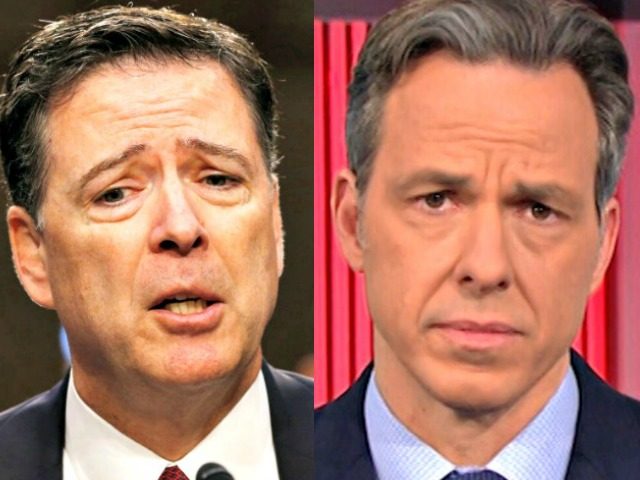On the eve of their annual blowout dinner – which President Donald Trump will again skip – the White House Correspondents’ Association (WHCA) stands poised to give four reporters from CNN an award for a January 2017 story – the veracity of which is challenged by former FBI Director James Comey’s recent remarks.
Published eight days before President-elect Trump took office in January 2017, CNN’s “Intel chiefs presented Trump with claims of Russian efforts to compromise him,” reported that Comey, along with then-Director of National Intelligence (DNI) James Clapper, CIA Director John Brennan, and NSA Director Admiral Mike Rogers, briefed Trump and then-President Barack Obama on “dirt” Russian intelligence allegedly collected on Trump.
The article, by CNN host Jake Tapper and co-workers Evan Perez, Jim Sciutto, and Carl Bernstein, is now up for the WHCA’s Merriman Smith Award. It makes a series of specific claims, among them: “The allegations were presented in a two-page synopsis that was appended to a report on Russian interference in the 2016 election.”
This claim in particular was called into question Thursday when Comey explicitly denied he presented any such two-page summary and said that the briefing was spoken only. “CNNreported a time that you handed two-page executive summary of the dossier over to him,” Baier asked Comey, to which he said, “I did not.”
Comey did not entirely rule out the existence of a two-page summary, but it was clear he did not present one to the president-elect.
“The dossier” referred to what is now publicly known to be the still unverified work of former British spy Christopher Steele, working in the pay of the Democratic National Committee for Fusion GPS. Among other things, it alleges Donald Trump engaged in bizarre urological acts with prostitutes in Moscow.
This dossier, as we now know from the so-called “Nunes memo,” was used to secure a FISA warrant against Trump-associate Carter Page and appears to have been a central data point in Special Counsel Robert Mueller’s “Russia investigation.” The Nunes Memo also shows the FBI knew who was funding the dossier at the time, but Comey still claimed Thursday to be unsure of the DNC’s involvement.
In January 2017, CNN characterized the dossier as follows: “The allegations came, in part, from memos compiled by a former British intelligence operative, whose past work US intelligence officials consider credible.”
Apart from its use by the FBI, the dossier was used in this very CNN article as a foundational text of what became the media’s “collusion” narrative over the next year. Tapper, et al. wrote:
These senior intelligence officials also included the synopsis to demonstrate that Russia had compiled information potentially harmful to both political parties, but only released information damaging to Hillary Clinton and Democrats.
…
The two-page synopsis also included allegations that there was a continuing exchange of information during the campaign between Trump surrogates and intermediaries for the Russian government, according to two national security officials.
Comey’s characterization Thursday of the Trump briefing also differed from CNN’s in several other respects. By his accounts, Comey alone briefed the president elect, at Clapper’s request – not as a group, as CNN suggests – and claims he was only present as Clapper briefed Obama. He again makes no mention of a two-page summary.
Despite these revelations, the WHCA judges characterizes Tapper, Perez, Bernstein, and Sciutto’s reporting as follows:
These four journalists and a number of other CNN reporters broke the story that the intelligence community had briefed President Barack Obama and then-President elect Donald Trump that Russia had compromising information about Trump. The CNN team later reported that then-FBI Director James Comey personally briefed Trump about the dossier. Thanks to this CNN investigation, “the dossier” is now part of the lexicon. The depth of reporting demonstrated in these remarkable and important pieces, and the constant updates as new information continued to be uncovered showed breaking news reporting at its best.
Comey’s role, if any, in this now-award winning reporting, has been the subject of intense speculation since the release of Comey’s contemporaneous memos. “I said to president-elect Trump media like CNN had [the dossier] and were looking for a news hook. I said it was inflammatory stuff,” Comey wrote days before the article, on January 7, 2017.
Comey denied he had anything to do with the leak and that neither Clapper nor Brennan did to his knowledge. “I don’t know who leaked it. I had no part in leaking any of it,” Comey told Baier when pressed Thursday.

COMMENTS
Please let us know if you're having issues with commenting.